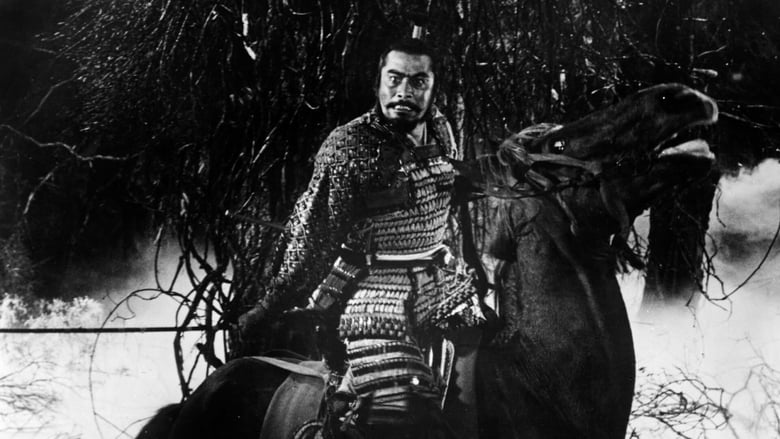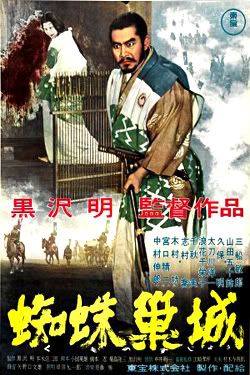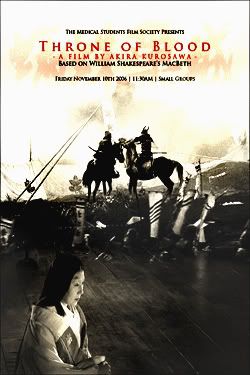← Back to Reviews

in
Plot Akira Kurosawa delivers his telling of MacBeth, reimagined in feudal Japan. After proving victorious in battle, Lords Washizu (Mifune) and Miki (Chiaki) become lost in Cobweb Castle. Eventually they come across an evil spirit who predicts great things for Washizu and great things for Miki's son. Washizu, with encouragement from his wife (Yamada), sets out to make the spirit's prophecy come true, no matter who he has to betray and kill along the way.
The first thing I feel I have to comment on is just how damn atmospheric the film is. From the opening seconds when we are presented with a rugged landscape shrouded in a thick fog a brooding, foreboding tone abounds. Throughout the film the weather reflects the tone and mood of the film as driving rain and swirling wind join the almost eternal fog, while birds flee from the forest and horses gallop wildly. And it's not just the sights either, but sound that creates the tone as screeching animals seem to surround the castle. And then of course there is the supernatural element of the evil spirit who visits Washizu and Miki in Cobweb Forest. It's terrifically conceived and very effective. Had it been in colour I think it's impact would have been lessened, perhaps even coming across as silly. The striking, high contrast black and white however helps to create the eerie, spooky tone of it all as we meet the spirit, bathed in light with a mist swirling about it.
I feel I need to ask a question at this point. How awesome is Toshiro Mifune? Now looking at imdb I see he has apparently starred in an astonishing 182 films. I've only seen 5 or 6 of those, but that's enough to make me confident of my answer very. As in very awesome! He just has such an incredible screen presence, it's impossible to take your eyes off him when he's on screen. His wild eyes and sheer intensity that he shows here are just insanely gripping, like a wild animal. His megalomaniacal samurai is a thrilling creation; a loyal and valiant warrior who is corrupted by ambition which sees him reach great heights, before his guilt and paranoia of others bring about his crushing downfall. A perfect embodiment of the sentiment If you live by the sword, you die by the sword.
All of that said however he almost has the film stolen from him by Isuzu Yamada's showing as Asaji (Washizu's wife), a terrifically intriguing character. She is dangerously ambitious, conniving and supremely manipulative. The engrossing performance from Yamada just helps to round it off. The way she plans and helps to carry out such dastardly acts in such a creepy, emotionless state is quite disturbing. I think one of the reasons I found her to be such a fascinating character was down to seeing her in this setting. Usually in Japanese society, at least films that depict the times presented here, the female characters appeared very weak and subservant. So to see such a powerful, robust performance was quite startling. As with Rashomon the acting style is quite high on energy and heavily stylised. With sparse dialogue much of their acting is achieved through body language, large gestures and facial expressions. It's all done so well that for fair chunks of the film even without subtitles on you could still have an idea of what is going on..
The sheer grand scale of the film is incredible. It really is a stunning spectacle, and when you take into account it's 55 years old then it makes it even more impressive a truly amazing accomplishment. Particularly impressive is Cobweb Castle. Kurosawa insisted on building the entire structure of the castle up on Mount Fuji, and it pays off big time. It just adds so much to the film. With some beautiful cinematography it is visually astonishing
The film's finale is fantastic, visually thrilling stuff. The jaw-dropping sight of the forest actually moving as was prophesied is outrageously wonderful, and then you have Washizu's tragic end. With a seemingly endless array of arrows raining down on him he ends up resembling something of a human porcupine. It's a terrifically grand swan song; very operatic and stunningly vivid. And again Mifune is incredible here as he prowls from side to side above his own army that are shooting at him, roaring in pain and fury, though I'm not sure how much credit he deserves for this particular segment of his performance. The reason? That I just discovered they were using real arrows! Probably not a lot of acting has to go on to capture fear and terror when that's happening.
As always Kurosawa's direction is excellent; almost peerless. Even with a number of silent stretches in the film (a few minutes with no dialogue here and there as we watch riders on horses or the returning of the Master's body to his castle) Kurosawa still keeps everything moving along at a brisk pace, especially when you look at all of the large elements it is tackling loyalty, betrayal, murder, war etc. To achieve it all in just a little over 100 minutes is impressive. Though it does feel a little different to the other work of his I've seen. It's feels a bit more cold and detached, lacking in some of the fierce passion usually found. The scenes indoors especially have quite a stagy and claustrophobic feel to them, set in rather sparse interiors. Though he still finds the opportunity to deliver moments that are more dynamic. Particularly when it comes to Washizu and Miki getting lost in the forest. His camera movements because fast paced and sweeping, creating a frantic feeling that leaves us the audience feeling just as lost and disorientated as his characters.
What's really quite interesting is the question of how self-fulfilling the prophecy actually is. Do things pan out the way they do just because it's the natural progression, or do they happen because of actions of the characters which are brought about by hearing the prophecy? Without hearing the prophecy how different, if at all, would the story have turned out?
Conclusion Another terrific work from Kurosawa. A film that combines both beauty and darkness to create something special, a film of haunting power. The performances from Mifune and Yamada are just the icing on the cake.

|

|
Year of release
1957
1957
Directed by
Akira Kurosawa
Akira Kurosawa
Written by
Hideo Oguni (script) / Akira Kurosawa (script)
Ryuzo Kikushima (script) / Shinobu Hashimoto (script)
William Shakespeare (story)
Hideo Oguni (script) / Akira Kurosawa (script)
Ryuzo Kikushima (script) / Shinobu Hashimoto (script)
William Shakespeare (story)
Starring
Toshiro Mifune
Isuzu Yamada
Minoru Chiaki
Takashi Shimura
Toshiro Mifune
Isuzu Yamada
Minoru Chiaki
Takashi Shimura
Throne of Blood
Plot Akira Kurosawa delivers his telling of MacBeth, reimagined in feudal Japan. After proving victorious in battle, Lords Washizu (Mifune) and Miki (Chiaki) become lost in Cobweb Castle. Eventually they come across an evil spirit who predicts great things for Washizu and great things for Miki's son. Washizu, with encouragement from his wife (Yamada), sets out to make the spirit's prophecy come true, no matter who he has to betray and kill along the way.
The first thing I feel I have to comment on is just how damn atmospheric the film is. From the opening seconds when we are presented with a rugged landscape shrouded in a thick fog a brooding, foreboding tone abounds. Throughout the film the weather reflects the tone and mood of the film as driving rain and swirling wind join the almost eternal fog, while birds flee from the forest and horses gallop wildly. And it's not just the sights either, but sound that creates the tone as screeching animals seem to surround the castle. And then of course there is the supernatural element of the evil spirit who visits Washizu and Miki in Cobweb Forest. It's terrifically conceived and very effective. Had it been in colour I think it's impact would have been lessened, perhaps even coming across as silly. The striking, high contrast black and white however helps to create the eerie, spooky tone of it all as we meet the spirit, bathed in light with a mist swirling about it.
I feel I need to ask a question at this point. How awesome is Toshiro Mifune? Now looking at imdb I see he has apparently starred in an astonishing 182 films. I've only seen 5 or 6 of those, but that's enough to make me confident of my answer very. As in very awesome! He just has such an incredible screen presence, it's impossible to take your eyes off him when he's on screen. His wild eyes and sheer intensity that he shows here are just insanely gripping, like a wild animal. His megalomaniacal samurai is a thrilling creation; a loyal and valiant warrior who is corrupted by ambition which sees him reach great heights, before his guilt and paranoia of others bring about his crushing downfall. A perfect embodiment of the sentiment If you live by the sword, you die by the sword.
All of that said however he almost has the film stolen from him by Isuzu Yamada's showing as Asaji (Washizu's wife), a terrifically intriguing character. She is dangerously ambitious, conniving and supremely manipulative. The engrossing performance from Yamada just helps to round it off. The way she plans and helps to carry out such dastardly acts in such a creepy, emotionless state is quite disturbing. I think one of the reasons I found her to be such a fascinating character was down to seeing her in this setting. Usually in Japanese society, at least films that depict the times presented here, the female characters appeared very weak and subservant. So to see such a powerful, robust performance was quite startling. As with Rashomon the acting style is quite high on energy and heavily stylised. With sparse dialogue much of their acting is achieved through body language, large gestures and facial expressions. It's all done so well that for fair chunks of the film even without subtitles on you could still have an idea of what is going on..
The sheer grand scale of the film is incredible. It really is a stunning spectacle, and when you take into account it's 55 years old then it makes it even more impressive a truly amazing accomplishment. Particularly impressive is Cobweb Castle. Kurosawa insisted on building the entire structure of the castle up on Mount Fuji, and it pays off big time. It just adds so much to the film. With some beautiful cinematography it is visually astonishing
The film's finale is fantastic, visually thrilling stuff. The jaw-dropping sight of the forest actually moving as was prophesied is outrageously wonderful, and then you have Washizu's tragic end. With a seemingly endless array of arrows raining down on him he ends up resembling something of a human porcupine. It's a terrifically grand swan song; very operatic and stunningly vivid. And again Mifune is incredible here as he prowls from side to side above his own army that are shooting at him, roaring in pain and fury, though I'm not sure how much credit he deserves for this particular segment of his performance. The reason? That I just discovered they were using real arrows! Probably not a lot of acting has to go on to capture fear and terror when that's happening.

As always Kurosawa's direction is excellent; almost peerless. Even with a number of silent stretches in the film (a few minutes with no dialogue here and there as we watch riders on horses or the returning of the Master's body to his castle) Kurosawa still keeps everything moving along at a brisk pace, especially when you look at all of the large elements it is tackling loyalty, betrayal, murder, war etc. To achieve it all in just a little over 100 minutes is impressive. Though it does feel a little different to the other work of his I've seen. It's feels a bit more cold and detached, lacking in some of the fierce passion usually found. The scenes indoors especially have quite a stagy and claustrophobic feel to them, set in rather sparse interiors. Though he still finds the opportunity to deliver moments that are more dynamic. Particularly when it comes to Washizu and Miki getting lost in the forest. His camera movements because fast paced and sweeping, creating a frantic feeling that leaves us the audience feeling just as lost and disorientated as his characters.
What's really quite interesting is the question of how self-fulfilling the prophecy actually is. Do things pan out the way they do just because it's the natural progression, or do they happen because of actions of the characters which are brought about by hearing the prophecy? Without hearing the prophecy how different, if at all, would the story have turned out?
Conclusion Another terrific work from Kurosawa. A film that combines both beauty and darkness to create something special, a film of haunting power. The performances from Mifune and Yamada are just the icing on the cake.
